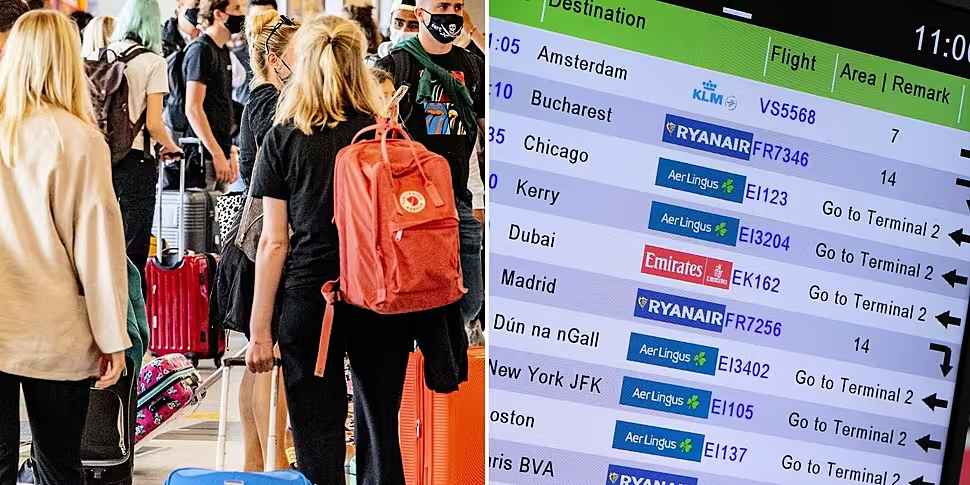International travel is resuming for the first time in 16 months, as Ireland rolls-out the EU Digital COVID Certificate.
Fully vaccinated people, those recently recovered from the virus or who can present a negative test are allowed travel around the European Union.
Over 22,000 people are expected to pass through Dublin Airport on Monday, as Aer Lingus and Ryanair have both ramped up their schedules.
People can also travel to Ireland from countries within the EU, Iceland, Lichtenstein, Norway and Switzerland with no requirement to quarantine if they have valid proof of being fully vaccinated, having recovered from COVID-19 or have had a negative PCR test not more than 72 hours prior to arrival.
Travellers coming from other countries, including the UK, will not have to quarantine if they have valid proof that they are fully vaccinated, or have recovered from COVID.
Those who travel on the basis of a negative PCR test will have to self-quarantine, which can be ended if they receive a second negative PCR test taken from day five.
 Image by Mark Timberlake from Pixabay
Image by Mark Timberlake from PixabayPassengers arriving into or returning to Ireland must also fill out a Passenger Locator Form.
While children between the ages of 12 and 17 will be required to have a negative PCR test taken within 72 hours prior to arrival into the country - unless they have valid proof of vaccination or recovery.
Children of any age who are travelling with vaccinated or recovered adults will not be required to self-quarantine.
But where one accompanying adult needs to self-quarantine, then all children must also self-quarantine.
People planning to travel are being reminded to first check the entry rules of the country they are going to, as destinations will have different rules in place.
The Government says over 1.1 million EU Digital COVID Certs have been e-mailed to people and over 600,000 have been posted.
A helpline has also been set up to help with issues regarding the certs and to request a recovery certificate – the helpline number is 1800-851-504.
People are also being advised to allow plenty of time in the airport/port, as there are now more checks in place.
Travel tips
When booking your trip
- Check the entry rules of the country you are going to – destinations will have different rules in place
- Check the rules that apply to children travelling – destinations will have different rules/testing requirements
- Have your Digital COVID Certificate – this will make it easier to travel in Europe
When returning from your trip/travelling to Ireland
- Fill out a Passenger Locator Form
- Have your Digital COVID Cert with you – you may be asked for this when you arrive back in Ireland
- Allow plenty of time in the airport/port – there are now more checks in place
- Antigen tests will not be accepted for entry/return to Ireland, only a PCR test will be accepted
Passengers arriving into Ireland from outside EU+ Iceland, Lichtenstein, Norway, Switzerland (including Great Britain)
Emergency brake mechanism
To protect its citizens against importation of variants of COVID-19, an 'emergency brake' mechanism will be coordinated at EU level to react swiftly to the emergence of variants of concern.
Government advice will be to avoid travel to a country where the emergency brake has been applied.
If your journey originates in a country to which an emergency brake has not been applied:
- If you have valid proof of vaccination, no travel-related testing or quarantine will be necessary
- If you have valid proof of recovery from COVID in the past 180 days, no travel-related testing or quarantine will be necessary.If you do not have valid proof of vaccination or recovery, you will need to:
- present evidence of a negative result from a RT-PCR test taken within 72 hours prior to arrival into the country
- self-quarantine for 14 days
- if you receive a negative result from a RT-PCR test taken from day five onwards after arrival into Ireland, you will be able to leave quarantine
If your journey originates in a country to which an emergency brake has been applied:
If you have valid proof of vaccination, you will need to:
- present evidence of a negative result from a RT-PCR test taken no more than 72 hours before arrival
- undergo self-quarantine
- if you receive a negative result from a RT-PCR test taken from day five onwards after arrival into Ireland, you will be able to leave quarantine
If you have valid proof that you have recovered from COVID-19 in the past 180 days, you will need to:
- present evidence of a negative result from a RT-PCR test taken no more than 72 hours before arrival
- undergo self-quarantine
- if you receive a negative result from a RT-PCR test taken from day five onwards after arrival into Ireland, you will be able to leave quarantine
If you do not have valid proof of vaccination or recovery, you will need to:
- present evidence of a negative RT-PCR test result taken in previous 72 hours before arrival
- undergo mandatory 14 day hotel quarantine
- if you receive a negative result from a RT-PCR test taken from day 10 onwards after arrival into Ireland, you will be able to leave quarantine









